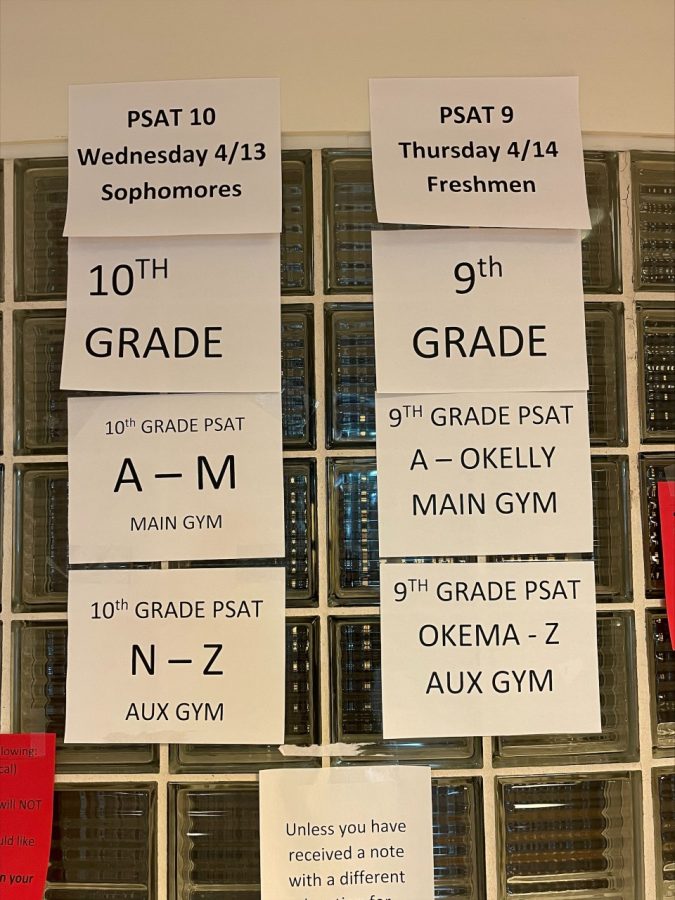April and state testing
With April’s arrival, state testing is on most students’ minds. With PSATs, SATs, and ACTs looming overhead, spring can be threatening. Here’s what to know about test season.
Colorado offers one free test to students per year–this can be either the PSAT (pre- SAT) or the SAT. Although there is only one free of charge, the state offers additional SATs as well as ACTs for approximately $55, according to Rocky Mountain High School counselor Betsy Flowers. Both tests are typically offered on Saturdays throughout the school year.
In order to register for SATs, the College Board is a useful resource, as they develop and administer the tests. From their website, students can check their scores on either their PSATs or SATs, and also find registration for additional SAT tests. All information is available on their website, https://www.collegeboard.org.
For ACT registration, simply visit https://www.act.org/ and click the “register” button. Creating an account is required in order to view scores following the test.
There are a few things to do to prepare for a test. There are practice PSAT, SAT, and ACT books for sale online, and often for checkout from school media centers. Khan Academy, www.khanacademy.org, also offers practice tests on its website. Depending on the test date entered, Khan Academy will put together a practice schedule for the SAT. It also offers other prep videos and lessons for the PSAT and ACT.
Taking one of these tests at school is fairly straightforward. It is typical for students to be assigned a gym or classroom to test in. The tests are split into chunks of time with breaks in between– the total test times of each are usually two hours and 45 minutes for the PSAT, two hours and 55 for the ACT, and three hours for the SAT.
Rocky Mountain High School does not offer a free ACT, so for many students who are unfamiliar with the test but wish to take it, it can be daunting.
“It’ll be similar to the SAT, there is a set day that you can sign up for–a bunch of people show up. There you will take the test…math, science–English, too,” Rocky senior Sebastian Walker said.
He found that the ACT is much like the SAT–multiple-choice and a similar process. Registering for the test on the ACT website allows students to find a testing location, date, and time close by. Also included with both ACT and SAT tests is an optional writing section. Some colleges require the writing section for admission, others do not. It’s a good idea to check before registering to see if a school you are interested in requires it.
Some students take multiple tests if they wish to improve their scores before college. It is possible to take either test during 11th or 12th grade–Flowers stated that students who take tests twice to improve their scores can submit whichever scores they like better on college applications.
It depends on the college which test scores they require on their applications, and since the COVID-19 pandemic, some colleges don’t want test scores at all. Flowers says it’s important to research the colleges you are looking into and see which scores they want.
“West coast schools usually take SAT scores, and east coast takes ACT,” explained Ben Johnson, media specialist at Rocky Mountain High School.
However, according to www.academicinfo.net, SATs are taken on the coasts, and ACTs are taken in the midwest and southern schools. Nevertheless, certain schools will take both, and some none at all. That is why Flowers emphasizes the importance of research.
Managing anxiety during test week can be difficult. According to mental health counselors at Rocky Mountain High School, there are actions to take that can help.
“Focusing on making sure you’re getting enough sleep the night before and leading up to testing is important,” said Rocky Mountain High School counselor Gina Defelice. “Physiological regulation–making sure you’re not going in on an empty stomach and you’re drinking enough water balanced with the hours you take studying.”
Combatting anxiety leading up to an exam requires some planning–using anxiety-reducing activities prior. A favorite among counselors is the “5, 4, 3, 2, 1” method. It requires you to list to yourself five things you can see, four things you can hear, three you can touch, two you can smell, and one you can taste. It is helpful to stay grounded instead of allowing anxiety to spiral.
If you feel yourself losing focus during the test, there are a few things you can do to reset. Psychologists recommend taking “stretch breaks” in between 20 to 30-minute study sessions, but during a state test, it can be difficult to do so. Counselors recommend doing something small in your seat. A specific exercise can be pressing your fists together hard for a few seconds and releasing. Tensing up your muscles and releasing them a few times can help to ground you during a long-term exam.
There is no doubt that a majority of students who take state tests feel anxiety when test dates approach. There are always resources available, however. Counselors are able to help when everything about April seems disorienting. Additionally, there are ways to prepare online and in textbooks, if you wish to do so. Good luck, students!



